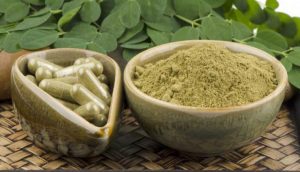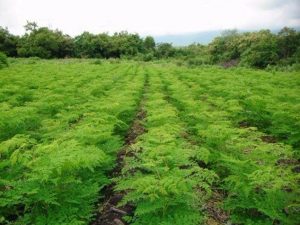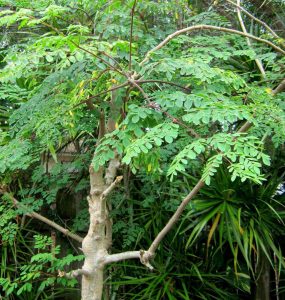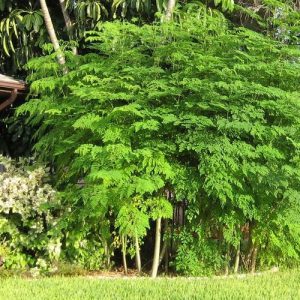Health Benefits of Moringa Oleifera
Health Benefits of Moringa Oleifera

Moringa oleifera is a plant that has been praised for its health benefits for thousands of years.
It is very rich in healthy antioxidants and bioactive plant compounds.
So far, scientists have only investigated a fraction of the many reputed health benefits.
Here are health benefits of Moringa oleifera that are supported by scientific research.

Moringa oleifera Is Very Nutritious
Moringa oleifera is a fairly large tree native to North India.
It goes by a variety of names, such as drumstick tree, horseradish tree or ben oil tree.
Almost all parts of the tree are eaten or used as ingredients in traditional herbal medicines.
This especially applies to the leaves and pods, which are commonly eaten in parts of India and Africa.
Below is a photo of Moringa oleifera leaves, powder and capsules:

A very fast growing, heat loving food tree from South India. Moringa is well reknowned for its nutrient dense leaves which are sold as a nutrient supplement . Very easy to grow even in areas with very less water.
In Western countries, the dried leaves are sold as dietary supplements, either in powder or capsule form.
Compared to the leaves, the pods are generally lower in vitamins and minerals. However, they are exceptionally rich in vitamin C. One cup of fresh, sliced pods (100 grams) contains 157% of your daily requirement.

The diet of people in developing nations sometimes lacks vitamins, minerals and protein. In these countries, Moringa oleifera can be an important source of many essential nutrients.
The amounts are negligible compared to what you consume if you eat a balanced diet based on whole foods.
Moringa leaves are an excellent source of many vitamins and minerals. One cup of fresh, chopped leaves (21 grams) contains :
Protein: 2 grams
Vitamin B6: 19% of the RDA
Vitamin C: 12% of the RDA
Iron: 11% of the RDA
Riboflavin (B2): 11% of the RDA
Vitamin A (from beta-carotene): 9% of the RDA
Magnesium: 8% of the RDA
In Western countries, the dried leaves are sold as dietary supplements, either in powder or capsule form.

Compared to the leaves, the pods are generally lower in vitamins and minerals. However, they are exceptionally rich in vitamin C. One cup of fresh, sliced pods (100 grams) contains 157% of your daily requirement.
Moringa oleifera is a fascinating tree with its multiple applications for different purposes. Every part of this plant is used in variety of applications including agriculture, dye, food, health care, livestock forage, personal care, water purification and many more. Due to the easy adaptation to various regions, soils and farm systems, it holds consistent position in international market. It is a softwood tree, native to India, known as drought resistant and grows well even in moderately infertile soil.
Moringa Oleifera is the best known species amount the thirteen species of the genus Moringacae. It was highly valued in the ancient civilizations. The Egyptians, Greeks and Romans derived oil from the seeds and used it for perfumes and skin care. In Indian sub-continent, people have used fresh pods and leaves as main vegetable food. The leaves are eaten throughout West Africa and parts of Asia. We supply quality seeds to moringa seed oil manufacturers.
Family: Moringacae
Species: Moringa Oleifera
Range: Native to the Indian sub-continent. It is naturalized in tropical and sub-tropical areas around the world.
Plant Description: It is deciduous tree or shrub, fast-growing, partially drought resistant, average height of 6 meters at full maturity.
There are 13 varieties of moringa species found. Find the below other twelve varieties of this species: Moringa Arborea, Moringa Borziana, Moringa Concanensis, Moringa Drouhardii, Moringa Hildebrandtii, Moringa Longituba, Moringa Ovalifolia, Moringa Peregrina, Moringa Pygmaea, Moringa Rivae, Moringa Ruspoliana and Moringa Stenopetala.
Physical Description
Moringa oleifera seeds are round shaped with brownish semi-permeable seed hull. It has three papery wings. Color of the hulls normally varies from brown to black. If seed kernels are of low viability, they will be white in color. Quality seeds germinate within two weeks of planting. Weight of each seed will be approximately 0.3 g. The kernel to seed ratio has been found to be 75:25.
It is a fast-growing tree. The tree is cultivated mainly for edible usages, dye coloring, health care, fodder, water clarification and multiple applications. The harvested seeds are dried, processed and used for oil extraction. It contains around 40% oil inside the kernel.
Germination and Planting
Tropical and sub tropical environment is suitable for moringa seeds growth. The seeds need sufficient sunlight and water to germinate. They must be soaked initially in water for about 12-24 hours, before sowing moringa seeds in the seedling bag or in soil. This process will help these seeds to absorb moisture needed for sprouting. Then these soaked seeds are wrapped in a wet cloth and kept in warm, dark location. Ensure that wrapped cloth is damp to enable seeds to retain moisture. The seeds will grow in new places quickly, where there is good water drainage and sunshine.
Most of the portions of moringa trees are edible. The tree usually grows up to 15 meters in height but usually less than 10 meters. It is a slender tree with delicate branches and has large underground rootstock. The tree is covered with small, oval-shaped dark green leaves. Its trunk is generally 10–45 cm wide. It is covered in pale-grey bark but may sometimes reach up to 60 cm in diameter.
Moringa Uses in Traditional Medicine
For centuries, people in many countries, mainly in India and Philippines have used moringa fruit, seeds, leaves, bark, flower and root as folk medicine for common ailments. The Indian traditional medicinal system, Ayurveda used the tree produces to treat over 300 diseases. As medicinal value of moringa oleifera had been suggested by traditional medicine, further clinical testing is required to explore more benefits.
Moringa oleifera seeds are helpful in weight loss
It’s one of the many uses of moringa oleifera seeds
The diet of people in developing nations sometimes lacks vitamins, minerals and protein. In these countries, Moringa oleifera can be an important source of many essential nutrients.
Moringa oleifera Is Rich in Antioxidants
Antioxidants are compounds that act against free radicals in your body.
High levels of free radicals may cause oxidative stress, which is associated with chronic diseases like heart disease and type 2 diabetes.
Several antioxidant plant compounds have been found in the leaves of Moringa oleifera.
In addition to vitamin C and beta-carotene, these include:
Quercetin: This powerful antioxidant may help lower blood pressure.
Chlorogenic acid: Also found in high amounts in coffee, chlorogenic acid may help moderate blood sugar levels after meals.
One study in women found that taking 1.5 teaspoons (7 grams) of moringa leaf powder every day for three months significantly increased blood antioxidant levels.
Moringa leaf extract may also be used as a food preservative. It increases the shelf life of meat by reducing oxidation.
Moringa May Lower Blood Sugar Levels
High blood sugar can be a serious health problem. In fact, it’s the main characteristic of diabetes.
Over time, high blood sugar levels raise the risk of many serious health problems, including heart disease. For this reason, it’s important to keep your blood sugar within healthy limits.
Interestingly, several studies have shown that Moringa oleifera may help lower blood sugar levels.
One study in 30 women showed that taking 1.5 teaspoons (7 grams) of moringa leaf powder every day for three months reduced fasting blood sugar levels by 13.5%, on average.
Another small study in six people with diabetes found that adding 50 grams of moringa leaves to a meal reduced the rise in blood sugar by 21%.
Scientists believe these effects are caused by plant compounds such as isothiocyanates.
Moringa oleifera May Reduce Inflammation
Inflammation is the body’s natural response to infection or injury.
It’s an essential protective mechanism but may become a major health issue if it continues over a long period of time.
In fact, sustained inflammation is linked to many chronic health problems, including heart disease and cancer.
Most whole fruits, vegetables, herbs and spices have anti-inflammatory properties. However, the degree to which they can help depends on the types and amounts of anti-inflammatory compounds they contain.
Scientists believe that isothiocyanates are the main anti-inflammatory compounds in moringa leaves, pods and seeds
Moringa Can Lower Cholesterol
Having high cholesterol has been linked to an increased risk of heart disease.
Fortunately, many plant foods can effectively reduce cholesterol. These include flaxseeds, oats and almonds.
Both animal- and human-based studies have shown that Moringa oleifera may have similar cholesterol-lowering effects.
Moringa oleifera May Protect Against Arsenic Toxicity
Arsenic contamination of food and water is a problem in many parts of the world. Certain types of rice may contain particularly high levels.
Long-term exposure to high levels of arsenic may lead to health problems over time.
For instance, studies have linked long-term exposure to an increased risk of cancer and heart disease.
Interestingly, several studies in mice and rats have shown that the leaves and seeds of Moringa oleifera may protect against some of the effects of arsenic toxicity
The Bottom Line
Moringa oleifera is an Indian tree that has been used in traditional medicine for thousands of years.
However, only a few of its many reputed health benefits have been studied scientifically.
To date, studies show that Moringa oleifera may lead to modest reductions in blood sugar and cholesterol. It may also have antioxidant and anti-inflammatory effects and protect against arsenic toxicity.
Moringa leaves are also highly nutritious and should be beneficial for people who are lacking in essential nutrients.
If you want to try Moringa oleifera supplements, there is an excellent selection available.




